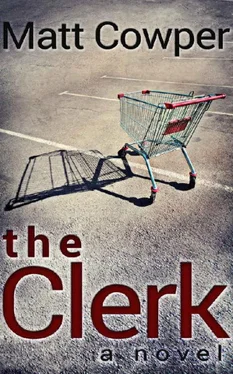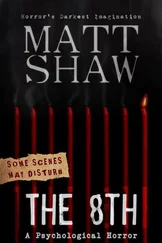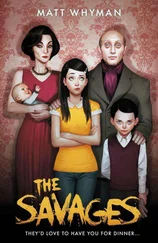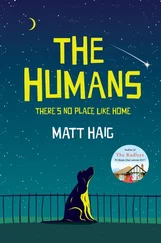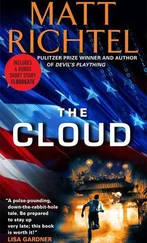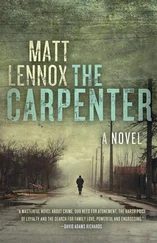He remembered one employee, name of Roy. He’d worked at Oxendine’s about a decade ago. Just out of high school, still living with his parents. He was a decent enough clerk, but obviously restless: he talked often about traveling the world, ridiculed the greasy rednecks of the area, and extolled the virtues of higher education. He seemed to regard Thomas as a particularly mawkish monument instead of a man: “Man, you’ve been here forever. It’s almost like you’re a part of the store, like Vernon is.” At first Thomas had chuckled, but when similar comments kept coming, he cornered Roy in the back room and told him to cut out the bullshit: “I give people plenty of leeway, but you’ve used all of yours up.” Roy had stammered and apologized, and from that day on he’d done his best to avoid Thomas. After about three months, he quit to “explore his options,” and Thomas never expected to see him again.
But he did see him once more, on an overcast winter day. Even for winter, it had been a slow day at Oxendine’s; it seemed like only a dozen or so customers had walked through the doors since opening. Thomas stood looking outside at the nearly-empty parking lot and the uniformly-gray sky. There were only three shopping carts in the corral. It almost wasn’t worth it to go out and bring them inside, but he felt like getting a bit of air. He grabbed his jacket from the back and walked outside.
He jammed the carts together, and the clanging metal was deafening in the stillness. In the way of shopping carts everywhere, the wheels spun, twisted, and rattled every which way. Thomas pulled them out of the corral, pointed them towards the store, and started to push them back to their indoor home, looking around him as he walked. After being inside all day, stepping out into the world could be disorienting; it felt like the entire sky was pressing down on him, and the air moved in currents and eddies that defied reason, unlike the immobile atmosphere of the grocery store.
As he was pushing, he noticed a man in a nearby black Lumina staring at him. The car looked vaguely familiar. The driver’s side window was rolled down, and a scratching noise that sounded like the radio buzzed outwards. Thomas returned the stare, wondering why this man was so intent on looking at him. As he approached, a spark of recognition lit in his mind. He knew that face… what was the guy’s name?
“Roy?”
It was indeed Roy, though a different Roy than Thomas remembered. The Roy he knew had been sleepy-eyed, with a lazily-maintained beard. This Roy was clean-shaven and alert, like a hawk perched on an electric line.
“Yes,” Roy replied, “it’s me.”
With a quick, angry movement, he turned off the radio. For a split-second, as he thrust his hand towards the dial, there was a horrible grimace on his face, as if the radio, which had been buzzing along innocently a few seconds ago, had suddenly turned into a mind-chafing annoyance that must be silenced. Then the grimace was gone, and he was staring at Thomas again.
“How’s it going?” Thomas asked, though he was strangely fearful of the answer.
“Oh, it’s going great,” Roy replied sardonically. “Just grand. Life is all sunshine and rainbows, and the home team won in the ninth, and the knight rescued the damsel from the evil baron.”
“Well.” Thomas didn’t know what else to say. Roy continued to stare. Thomas felt like the field mouse who knows the hawk has seen him and is now swooping down to rend with talon and beak. He didn’t like feeling this way, for obvious reasons, so he set his jaw and made his voice as gravelly as possible.
“What’s going on?” Thomas asked. “You look like you want to murder someone.”
This observation stunned Roy. Perhaps he didn’t know exactly what his expression looked like. Perhaps he did, but had expected Thomas to quail beneath his cold steel stare. Whatever the reason, his features softened a little, and a small twist of his upper lip even suggested a smile, however bitter.
“Yes, I am feeling out of sorts lately,” he said.
“What’s the problem?”
“Problems, plural. I have a few of them.”
Thomas waited, but Roy didn’t elaborate.
“That’s not very specific,” Thomas finally said, frowning.
“That’s true,” Roy said, and he finally looked away from Thomas, turning to stare at Oxendine’s Grocery for several long moments. When he finally looked back, his features had softened even more, and he looked close to the old Roy.
“You know,” Roy said softly, “I did enjoy working here.”
“Yeah, I believe it,” Thomas replied, though he didn’t know if he believed it or not. Roy said nothing to this. Apparently he expected more. Thomas searched for a suitable phrase, finally saying: “You were a good worker.”
“Thank you. No one likes to be remembered as a slacker.”
“No, they don’t.”
“But I did quit. Didn’t I?”
“Yeah,” Thomas admitted, “you did.”
Again, Roy expected more.
“But a lot of people quit,” Thomas said, a bit too sharply. Roy needed to stop staring and willing him to say things and tell him what the hell was going on.
“Yes, they do. I guess it’s not a job for everyone, is it?”
“Well, no, it’s not.”
“It’s a job for you , though — isn’t it?”
Thomas couldn’t tell if this was said with mockery, appreciation, or bewilderment. Perhaps Roy didn’t know either. In any case, Thomas was tired of this cryptic back-and-forth.
“Roy, you’re acting strange,” he said crossly. “Why don’t you stop this staring contest and tell me what’s up?”
Again, Roy seemed stunned. He sighed deeply, and it was one of the most feeble, hopeless sighs Thomas had ever heard.
“Like I said, I’ve got problems,” Roy finally replied. “I went off to college, but I couldn’t hack it. Didn’t understand the work, couldn’t make any friends. Everyone seemed smarter than me. And cooler. So I dropped out.”
“Well, college isn’t for everyone. No shame in dropping out.”
“Tell that to my parents.”
“Don’t worry about them. Shit, my parents still want me to go off to college. You’ve got to live your life your way.”
“But have you ever thought about going to college? I mean, haven’t you felt that pull ?”
No, Thomas had never gone to college like Roy, but he’d had a similar experience, and the memory of it surged into his consciousness, like sewage flowing out of a busted line.
Back when Thomas was in tenth grade, someone had nominated him for the International Leaders of Tomorrow Conference (ILTC). Thomas never knew who it was, as his parents (mainly his father) had instantly pounced on the opportunity, signed him up without consulting him, and then bombarded him with a hurricane of details about the program. It was some time before Thomas could retreat to his room and look over the ILTC materials by himself.
The ILTC, according to its brochure, was “an exciting experience that will show today’s promising youths how to become tomorrow’s acclaimed leaders.” Thomas was intrigued to learn that he was “promising,” as his GPA told a different story. He also didn’t consider himself a leader; most “leaders” at his high school thought that tersely-delivered commands disguised as innocent suggestions and appropriation of other’s ideas were the cornerstones of leadership.
As he continued thumbing through the brochure, he was edified to learn that the ILTC had “brought together students from 75 countries since our inception in 1980” and that “ILTC participants travel to learning-intensive locales to collaborate on horizon-expanding projects and to hear speeches and lectures from top academics, business leaders, and activists.” It all sounded very sunny and innocent. The Thomas of age forty knew that the whole thing was a money trap, just another vacation-cum-resume-stuffer that middle-class parents foisted onto their children, but the Thomas of age sixteen thought the whole thing sounded mighty swell.
Читать дальше
